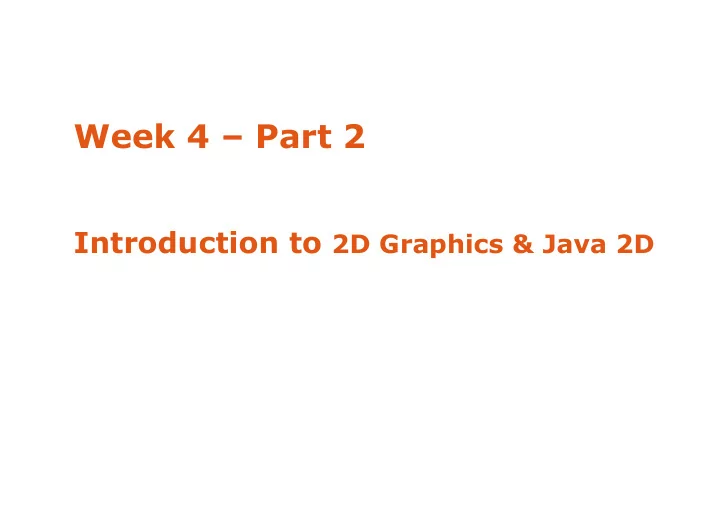

Week 4 – Part 2 Introduction to 2D Graphics & Java 2D
2D graphics Vector graphics � Use of geometric primitives: points, lines, curves, etc. � Primitives are created by using mathematical equations � Can be zoomed infinitively, moved or transformed without losing in quality Raster (bitmap) graphics � Images represented as pixels � Resolution dependent: scaling affects image quality � Stored in image files
Types of image editors Vector-based � Adobe Illustrator � CorelDraw � Inkscape Raster-based � Photoshop � Painter � GIMP
Java 2D API Provides 2D graphics, text & image capabilities � Wide range of geometric primitives � Mechanisms for hit detection of shapes, text, images � Color & transparency � Transformations � Printing � Control of the quality of rendering
Java 2D – Base classes Graphics class : abstract base class for all graphics contexts, allowing applications to draw onto components public class RectWidget extends JPanel { private int posx, posy, w, h; private Color color; public RectWidget(int x, int y, int w, int h, Color color){ this.posx = x; this.posy = y; this.w = w; this.h = h; this.color = color; } public void paint( Graphics g ) { g.setColor(color); g.drawRect(x, y, w, h); } }
Java 2D – Base classes JComponent’s relevant methods public paint(Graphics g) protected paintComponent(Graphics g) protected paintBorder(Graphics g) protected paintChildren(Graphics g) public print(Graphics g) protected printComponent(Graphics g) protected printBorder(Graphics g) protected printChildren(Graphics g)
Java 2D – Base classes Graphics2D class : extends Graphics class to provide more sophisticated control over geometry, transformations, etc. private double x, y, w, h; ... public void paint( Graphics g ) { Graphics2D g2 = (Graphics2D)g; g2.draw(new Rectangle2D.Double(x , y, w, h)); }
Geometric primitives
Shapes Quadratic Bézier curve Cubic Bézier curve Arbitrary shapes ( GeneralPath )
Bézier curves Parametric curves widely used in Computer Graphics Used to model smooth curves that can be scaled indefinetely First studied by mathematician Paul de Casteljau (1959) and widely publicized by Pierre Bézier (1962)
Bézier curves Defined by a set of control points: P 0, ..., P n Linear Bézier curve : straight line between P 0 and P 1 B(t) = (1 – t )P 0 + t P 1 , t ∈ [0,1] Quadratic Bézier curve : B(t) = (1 - t ) 2 P 0 +2(1 - t ) t P 1 + t 2 P 2 , t ∈ [0,1] Cubic Bézier curve : B(t) = (1 – t ) 3 P 0 +3(1 – t ) 2 t P 1 +3(1- t ) t 2 P 2 + t 3 P 3 , t ∈ [0,1]
Examples in Java // create new QuadCurve2D.Float QuadCurve2D q = new QuadCurve2D.Float(); q.setCurve(p0.getX(), p0.getY(), p1.getX(), p1.getY(), p2.getX(), p2.getY()); g2.draw(q); // create new CubicCurve2D.Double CubicCurve2D c = new CubicCurve2D.Double(); c.setCurve(p0.getX(), p0.getY(), p1.getX(), p1.getY(), p2.getX(), p2.getY(), p3.getX(), p3.getY()); g2.draw(c);
Curves from points Given a sequence of points, how do we create a smooth curve?
Curves from points Given a sequence of points, how do we create a smooth curve? Easy but ugly: connect the points with straight lines
Curves from points Better solutions: parametrize the curve as connected cubic Bézier curves C 3 C 4 C 2 B-spline C 5 C 6 S 1 ...S 4 are the points C 1 ...C 6 are additional C 1 control points
Arbitrary shapes GeneralPath path = new GeneralPath(); Move the current point of the path to the given point path.moveTo(x, y); Add a line segment to the current path path.lineTo(x, y); Add a quadratic curve segment to the current path path.quadTo(ctrlx, ctrly, x2, y2); Add a cubic curve segment to the current pathclosePath path.curveTo(ctrlx1, ctrly1, ctrlx2, ctrly2, x3, y3); Close the current path path.closePath();
Stroking and painting stroke patterns gradient filling colors filling patterns
Rendering hints & antializing public void paint (Graphics g){ Graphics2D g2 = (Graphics2D)g; RenderingHints rh = new RenderingHints(RenderingHints.KEY_TEXT_ANTIALIASING, RenderingHints.VALUE_TEXT_ANTIALIAS_ON); g2.setRenderingHints(rh); ... }
Clipping Restricts the drawing area to be rendered
Clipping Restricts the drawing area to be rendered rect.setRect(x + marginx, y + marginy, w, h); g2.clip(rect); g2.drawImage(image, x, y, null);
Tansformations rotate, scale, translate, shear methods of Graphics2D g2.translate(100, 200); AffineTransform class AffineTransform atransf = new AffineTransform(); atransf.rotate(Math.PI/2); // rotate 90 ° g2.transform(atransf);
Affine Transformations
Recommend
More recommend